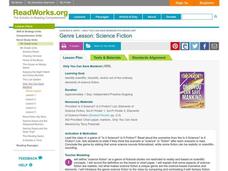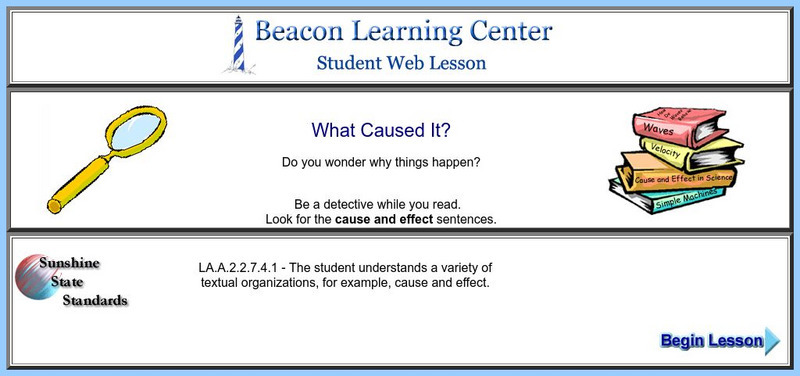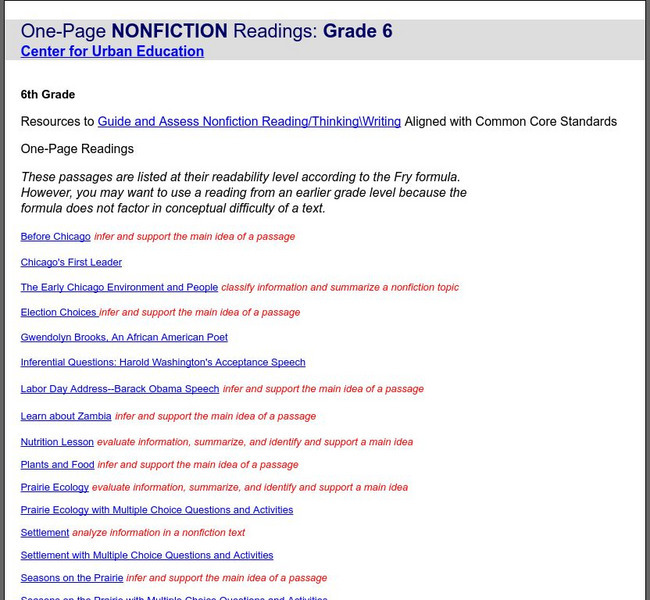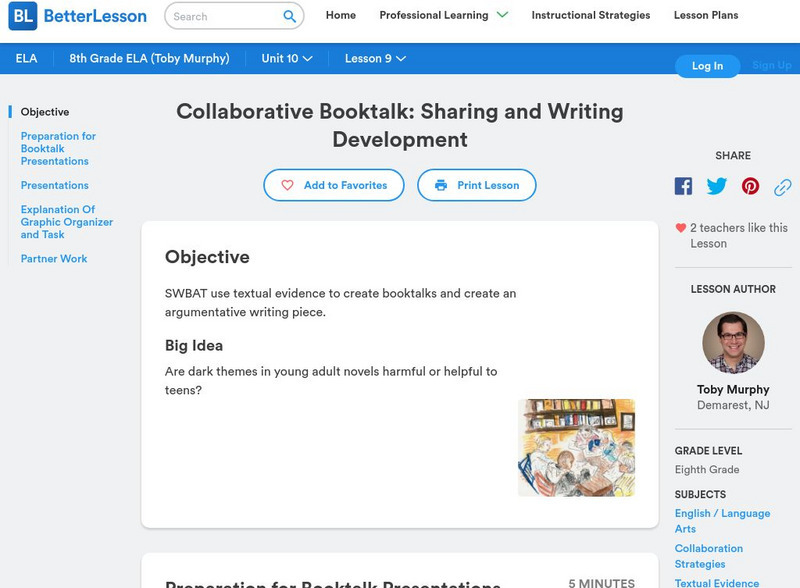Curated OER
Using Plot Elements to Retell a Story
The stories in Sandra Cisneros’s The House on Mango Street form the basis for a lesson on plot elements. The class examines introduction, sequence, problem, rising action, climax, falling action and resolution and identifies these...
Curated OER
Genre Lesson: Science Fiction
Sixth graders explore the components of science fiction in a science and literacy lesson. As they define and record definitions of the term on the board, learners identify a text as science fiction using the terms they have listed to...
Curated OER
Textual Analysis Lesson: Taking Stock of the Stock Market
For this reading comprehension lesson, 6th graders read and analyze the novel, The Westing Game, by Ellen Raskin. Students, after reading chapters 3-5, answer 8 reading comprehension questions about the stock market. Students add on to...
Curated OER
Science Fiction
Do your sixth graders like science fiction? Learn to identify elements of the science fiction genre with a literature lesson. They read from Only You Can Save Mankind and identify the objects, words, and characters from the scenarios....
Curated OER
Textual Analysis: Forensic Science Files: Handwriting Analysis
Learn to analyze handwriting samples in a textual analysis lesson. Middle schoolers complete a textual analysis procedure based on the text Sammy Keyes and the Hotel Thief. They also provide supporting evidence for their work.
Curated OER
Identifying Symbols
Identify symbols within text and explain what they mean. Sixth graders examine Home of the Brave and identify recurring pictures in the text and discuss what they mean. They then choose a symbol from the text and explain what it means...
Curated OER
Just Lookin' For a Home
What is a boll weevil? Your class can find out that and more by following the activities included here. Pupils read an article, sing a boll weevil song, add to the song with their own original lyrics, illustrate the song, study the...
PBS
Pbs Learning Media: Walmart Middle School Litercy Initiative
Interactive, student-paced lessons on such literacy skills as categorizing, comparing and contrasting, summarizing, evaluating, determining cause and effect, using text features, connecting, inferring, sequencing, understanding problems...
Beacon Learning Center
Beacon Learning Center: What Caused It?: Student Web Lesson
Students are asked to be detectives while they read and to look for the cause/effect sentences in the paragraphs. In this lesson, students read paragraphs and answer questions about it by either typing in their responses or selecting...
Polk Brothers Foundation Center for Urban Education at DePaul University
De Paul University: Center for Urban Education: Nonfict Readers Analyze Structure/views[pdf]
This graphic organizer contains questions for students as they analyze any nonfiction text. Students will read closely to determine the text's structure, viewpoint, and tone. This graphic organizer is a copyrighted material that may be...
Polk Brothers Foundation Center for Urban Education at DePaul University
De Paul University: Center for Urban Education: Comprehensive Questions: Nonfiction [Pdf]
Questions are provided to help students determine the main idea, topic, and fact versus opinion of a nonfiction piece. Students are prompted to write a summary of an informational text.
Other
Curriculum Associates: Determining Theme or Central Idea [Pdf]
In this reading comprehension lesson unit, students are guided in learning how to find the main theme or idea of a text and understanding how details in the text convey that. Includes lots of exercises and examples, as well as...
ReadWriteThink
Read Write Think: Playing With Genre Through Newspapers and Short Stories
Contains plans for three lessons that ask students to compare narrative writing (short stories) to expository writing (news articles) in order to understand what makes each genre unique. In addition to objectives and standards, this...
Other
Academic Reading: Sample Task [Pdf]
This Academic Reading task provides a practice assessment for identifying headings and subheadings. In the task, students must read the selection and then determine the best subheading for each of the sections.
Polk Brothers Foundation Center for Urban Education at DePaul University
De Paul University: Center for Urban Education: One Page Nonfiction Readings: Grade 6
This site contains 17 nonfiction articles that are appropriate for students with a 6th grade reading level, as measured by the Fry Formula. Questions for each passage are provided. Graphic organizers are available for these copyrighted...
Read Works
Read Works: Passages: The Film Editor
[Free Registration/Login Required] Students read a nonfiction text about the job of a film editor and answer questions about comprehension, supporting details, inferencing, main idea, and more. Links to a paired text and paired text...
Sophia Learning
Sophia: Common Themes in Literature
This tutorial focuses on common themes in literature, beginning with a slide show discussing 11 different, common themes and literary examples. This is followed by a 11-minute YouTube video with students acting out common themes in...
Polk Brothers Foundation Center for Urban Education at DePaul University
De Paul University: Center for Urban Education: Comprehensive Assessment: Nonfiction [Pdf]
Questions are provided to help students determine the main idea, topic, purpose, and opinion of a piece of nonfiction. Students are prompted to write a summary of the informational text.
Texas Education Agency
Texas Gateway: Summarize Informational/expository Text (English 6 Reading)
[Accessible by TX Educators. Free Registration/Login Required] Learn how to summarize the main ideas and supporting details in text and understand that a summary does not include opinions.
Texas Education Agency
Texas Gateway: Themes in Literary Texts (English 6 Reading)
Learn how to infer the implicit theme in a work of fiction, distinguish theme from topic, and make complex inferences using textual evidence.
Texas Education Agency
Texas Gateway: Synthesize Ideas in Informational/expository Texts
[Accessible by TX Educators. Free Registration/Login Required] Learn how to synthesize and make logical connections between ideas within a text and across two or three texts representing similar or different genres (including literary...
CommonLit
Common Lit: Where Did I Come From
CommonLit.org is a wonderful resource to use in a Language Arts classroom. Each story or article is accompanied by guided reading questions, assessment questions, and discussion questions. In addition, students can click on words to see...
Texas Education Agency
Texas Gateway: Describe Themes in Literary Texts (English 7 Reading)
[Accessible by TX Educators. Free Registration/Login Required] This lesson is about themes, the central messages in literature. Whatever their genre might be, writers have some wisdom, some universal truth or insight to share; this...
Better Lesson
Better Lesson: Collaborative Booktalk: Sharing and Writing Development
Are dark themes in young adult novels harmful or helpful to teens? Students will explore this question and will create an argumentative writing piece based on textual evidence. Videos of the lesson in action, examples of student work,...



















